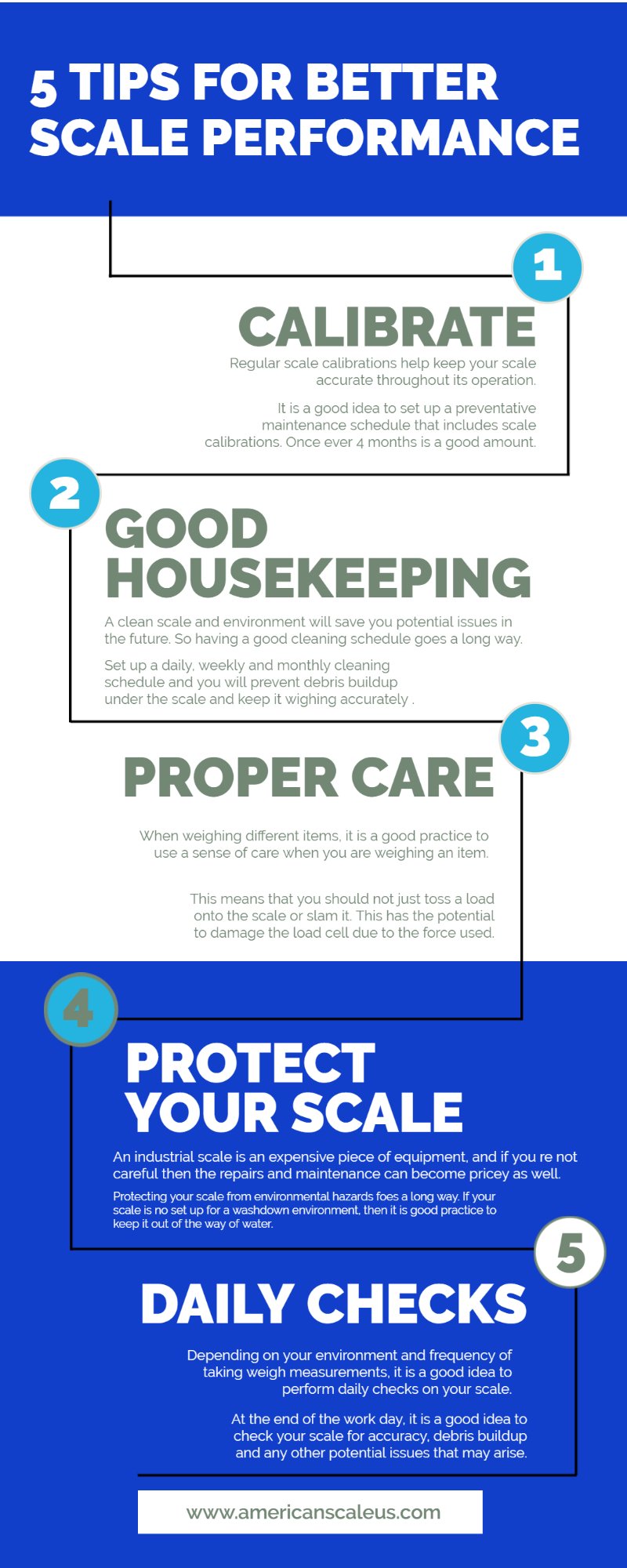Improving Scale Performance.
Scales are important tools for measuring the weight of objects, and they are used in a variety of industries including agriculture, transportation, and manufacturing. Even though they are very useful pieces of equipment, they still have potential to increase efficiency, productivity and performance. To ensure that your scale is providing accurate and reliable measurements, it's important to take steps to maximize its performance. This article will go over five tips on improving your scale’s overall performance. These tips are easy to follow and in most cases DIY friendly.
Calibration: When your scale is being used frequently, there will be a good chance that over time, it will lose its accuracy. Setting up a calibration schedule can help reduce accuracy loss. Regularly calibrate your scale. Calibration is the process of adjusting a scale to ensure that it is providing accurate measurements within its specified tolerance. Most scales should be calibrated at regular intervals, typically every six months to a year. If you are unsure of how to calibrate your scale, consult the manual or contact the manufacturer for guidance.
Good Housekeeping: A clean work area and clean tools help reduce the amount of potential errors that can happen due to a messy work site. So the best way to avoid this is to keep your scale clean. Dust, debris, and other contaminants can interfere with the accuracy of a scale, so it's important to keep it clean. Use a soft, damp cloth to clean the platform and display, and avoid using any harsh cleaners or abrasives.
Good Form: When weighing an item, one cannot simply carelessly toss a load on to the scale. This can cause damage to the load cells, or the scale or both. Using good form when placing a load onto a scale is a quick way to reduce damage. If the load is a bit difficult to handle, then it is a good idea to get assistance, or use a tool that makes placing the load on the scale a lot safer. Use the correct weighing technique. To ensure accurate measurements, it's important to use the correct technique when weighing objects on a scale. Place the object to be weighed on the center of the scale platform, and avoid bouncing or jarring the scale.
Protect Your Investment: The amount of abuse industrial scales take is unprecedented. It is good practice to protect your scale in any way you can. This can be in the form of upgrading or converting your scale to a washdown scale to adapt to an environment with a lot of moisture. Converting or adding a washdown scale can also protect your scale from extreme temperatures. Extreme temperatures can affect the accuracy of a scale, so it's important to protect it from extreme heat or cold. Avoid exposing the scale to temperatures outside of its specified operating range, and be sure to store it in a cool, dry place when not in use. When using larger scales like truck scales, you will want to be aware of possible lightning strikes. Depending on the manufacturer, certain scales have protection from lightning. Looking into those options could prove to be beneficial.
Daily Checks: A scale gets a lot of usage from day to day. There is a chance that during each measurement, there could have been something that could potentially cause an inaccuracy issue later down the road. Setting up a daily scale inspection can help you get ahead of any potential issues before they happen. Daily checks can be visual inspections, checking that the scale is reading accurately, and performing daily cleaning to keep the scale running well. Regularly check for errors or incorrect readings. Even with regular calibration and proper use, scales can sometimes experience errors or provide incorrect readings. To help detect and troubleshoot these issues, it's a good idea to regularly check your scale for errors or incorrect readings. Create a daily scale check list to help keep track of the tasks needed to complete during each inspection.
Closing Words
By following these tips, you can help ensure that your scale is providing accurate and reliable measurements. Regular calibration, proper use, and regular checks can help to maximize the performance of your scale and ensure that it continues to provide accurate weight data.
At American Scale we strive to bring you informed and useful content on all things scale systems related, including products from the top scale manufacturers. Be sure to check out our truck scale articles about truck scale foundation or how much do truck scales cost. We even have a guide to warranties. To learn more about bench scales, it would be good to check out our other articles such as “Bench Scale Basics'' and “How Much Does A Bench Scale Cost?”. These articles will help with the basics of bench scale ownership. Also, take a look at our “Common Problems With Bench Scales'', to help prolong the lifespan on your scale.

